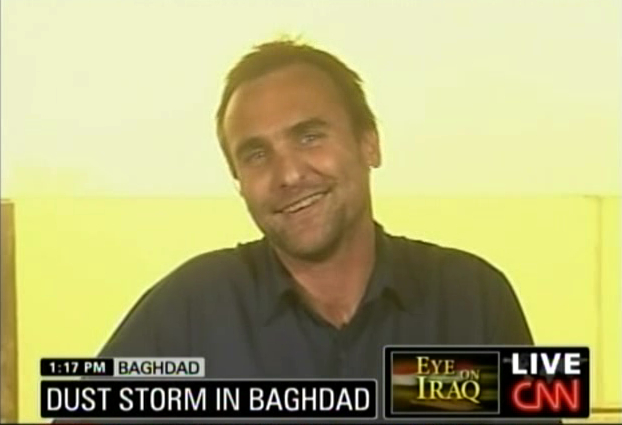NR: "Unfortunately, this doesn't mean any of the GIs are coming home any time soon."
June 28, 2009

Length: 4:23
LARGE (50.9 MB) ----- SMALL (5.4 MB)
Michael begins a series of reports as Baghdad is covered by another sandstorm. He gives Betty Nguyen the rundown on the troop withdrawal next Tuesday; she then asks him about the sandstorm that turns everything yellow behind him. A fine dust coats everything, he says; she tells him to go take a shower.
BETTY NGUYEN: It is the next step in the move to get out of Iraq. U.S. troops are due to be out of the country's cities by Tuesday, and it's all part of a security pact between Baghdad and Washington.
CNN's Michael Ware joins us now live from Baghdad.
So how many troops does this mean will actually be coming home because of the pullout?
MICHAEL WARE, CNN INTERNATIONAL CORRESPONDENT: Betty, the answer's very simple: none. You're still going to have 130,000 U.S. troops based here in the country, though their hands military will very much be tied by the Iraqi government.
They've got to pull out of all of the Iraqi cities and towns; they retreat to pre-approved bases. And they can no longer conduct operations on their own in the cities without the express invitation or permission of the Iraqis.
We're still going to see a few troops, advisers embedded with Iraqi units. There are still going to be some joint operations and partnered patrols. But unfortunately, this doesn't mean any of the GIs are coming home any time soon. American still only has 18 months to get these 130,000 home under an international agreement the Bush administration signed in the dying days of its government. But in terms of today meaning that there's any homecomings about to happen, I'm afraid to disappoint - Betty.
NGUYEN: All right, Michael. Well, if these troops are pulling out of some of the major cities, is there a concern that the Iraqi security forces will not be able to handle the security demands?
WARE: There's no concern at all, Betty, because there's no question: No, they can't handle the security demands whatsoever. That's why 130,000 troops will stay here.
Essentially, it's an insurance policy. But a policy at the behest and at the whim of the Iraqi government. The U.S. forces are now very much in a supporting role.
What they're doing, however, is what's called stability operations, making sure the Iraqis don't get themselves killed in any great numbers, and assisting where the Iraqis need it. And that's in areas like air support, artillery. It's what in military terms they call "enabling."
So it's going to be the Iraqis fighting what is now the Iraqi fight. But the Americans will be here to give them a little bit of muscle if and when they need it - Betty.
NGUYEN: All right. Well, that being the case, how are Iraqis responding to this troop pullout? Are they a little nervous about it?
WARE: Well, it's mixed feelings, to be honest. And it's more one way than the other.
There's some here in Iraq who are very, very nervous. In fact, we spoke to one woman who said - who begged the American military and the commander here, General Ray Odierno, not to take your eyes off us. She said the concept fills her with horror.
But she's among the few. Most Iraqis are absolutely joyous that the U.S. occupation of their country is coming to an end, as far as they see it. I mean, they've had - what? - six, almost seven years of foreign tanks in their streets, foreign troops rousting families in their homes in the middle of the night, dragging their men off to foreign-run prisons.
People are sick of it. Iraqis want to be Iraqi. Now that may come at a heavy price, but for now, the Iraqis are ready to pay it - Betty.
NGUYEN: All right. I just got to ask you about this, because from the shot, it looks like you're sending right next to the sun there. But that's actually - what? - a dust storm behind you? What's going on there?
WARE: Yes, it's - it - it - it would be nice if it was a blizzard, if that were snow. But yes, it's dust. Everything I touch, leaves a film.
This is a very Iraqi situation. But it this way: If I had an airline ticket to be coming home today, I wouldn't be leaving. And this stuff - this stuff is so fine, it doesn't matter how well you close your windows, you still wake up covered in a thin film of dust. It's such a pleasure to be here.
NGUYEN: Well, hey, go take a shower. We'll talk to you shortly. Thank you.
(LAUGHTER)
NGUYEN: All right.
WARE: You're not the first person to tell me that.
(LAUGHTER)
WARE: Thanks.
(LAUGHTER)
NGUYEN: For different reasons, I imagine.
All right. Talk to you later.
(LAUGHTER)
HOLMES: Yes. He gets that a lot, actually.
(LAUGHTER)
HOLMES: No.
NGUYEN: He's great though.
HOLMES: Next...
NGUYEN: But yes, they're dealing with a lot there. Like he said, it shut down part of the Baghdad airport. A lot of people having respiratory problems.
HOLMES: Yes, showing up at the hospitals there..
NGUYEN: People are wearing those surgical masks and walking down the streets in Baghdad. So, dealing with it.
But it happens fairly often there.
HOLMES: And it's bad. And you can see, in that shot, you can tell, it looks like - like you said, it's the sun beaming behind him or something.
NGUYEN: Like he's standing right next to the sun. It's crazy-looking.
